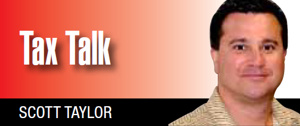Provincial tax rates can make a significant difference in what you pay
In theory, GST/HST should be a simple tax to file. You write down what you paid on business expenses and the amount will be fully refunded to you. What’s difficult is that there are so many different rates and rules to follow.
With British Columbia and PEI having changed their GST/HST rates effective Apr. 1, there are now four different rates in this country. Alberta, B.C., Manitoba, Quebec, and Saskatchewan are at 5%; New Brunswick, Newfoundland, and Ontario are at 13%; PEI is at 14%; and Nova Scotia is at 15%.
Those provinces charging 5% might look cheap, but they are not. All except Alberta have a provincial sales tax in addition to the GST/ HST, and you don’t get this back as a credit. So if you get your truck repaired in B.C. for $100, the total including PST and GST/HST would be $112. You can claim only the GST/HST portion – $5 – meaning your net cost is $107. If you spend that same $100 in Ontario, a province with no PST on repairs, you’ll be charged $113 including GST/ HST but you’ll get to claim $13 back. Your net cost is $100.
Because sales tax rates and rules vary from province to province, you’d better be paying attention to your receipts when you make your claim.
Should you collect GST/HST?
If you’re an owner/operator working for a carrier, your sales/income are “zero-rated” and therefore you should not collect GST/HST for your services. You still get to claim credits on any GST/HST paid on your business expenses, thereby giving you a refund, but this refund, of course, is just you getting your own money back.
While the act of trucking for a carrier is zero-rated, most of your other business activities are taxable. For example, if you’re going to truck for someone on the side and he’s not a carrier, you must charge GST/HST on the amount.
A “self-employed driver” must charge GST/HST for his services if he exceeds the annual $30,000 gross limitation. By definition, a self-employed driver does not use his own truck and does not assume liability for the supply of a freight transportation service for GST/HST purposes. He is providing a driving service, which is taxable.
I can’t tell you how many times I’ve run into small carriers using self-employed drivers and refusing to pay GST/HST to them on their gross earnings. I mean, they’re already taking a risk trying to avoid the whole “employee” issue, so why take another risk and not pay GST/ HST? They’ll get it back on their returns anyway.
Some will try to argue that if the self-employed driver is taking a load from Canada to the US, the service is zero-rated and not subject to GST/HST. However, Canada Revenue Agency has issued an information circular and deemed that the delivery of the “service” is considered delivered to the carrier’s office.
Assuming the carrier is Canadian, GST/HST applies to driving a truck to the US and back. (For details, visit the CRA Web site and look up RC 4080 – GST/HST Information for Freight Carriers and GST/HST Memorandum 28.2 – Freight Transportation Services. It’s all there and easy to read).
The real crime in all this is that you, as a self-employed driver, are responsible for charging GST/HST on your services.
If you are working for a carrier that refuses to pay GST/HST and you’re audited, CRA is going to hand you the bill.
Selling your truck
If you sell your truck or any other business equipment, you have to charge GST/HST.
And buyer beware: If you think you can go to the licence office and pay the GST/HST there when you transfer the ownership instead of paying tax to the seller, think again. You are really paying PST at the licence office, and it is not refundable (Ontario, for example, used to have a special form where you can apply and get PST back, but not anymore).
If you buy a used truck in a private deal, make sure the seller charges GST/HST on the bill of sale and shows his account number. If you have questions about how to properly charge and report GST/HST, talk to your accountant.
Auditors don’t want to hear how complicated it is to record expenses or calculate the right amounts. More importantly, you want to claim back every penny that you’re entitled to receive.
Scott Taylor is vice-president of TFS Group, providing accounting, bookkeeping, tax return preparation, and other business services for owner/operators.
Learn more at www.tfsgroup.com or call 800-461-5970.
